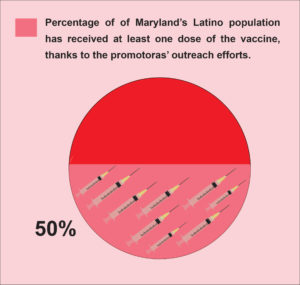
The Maryland Promotora Model- Aiding Latino Residents During COVID-19
With language and cultural barriers presenting difficulties for Latino neighborhoods to attain the information needed to get fully vaccinated, community volunteers are pitching in to close the vaccination gap between white and Latino residents.
CASA, a Latino and immigrant advocacy organization, has sent out promotoras, health promoting volunteers, to Latino neighborhoods in the suburbs of Maryland. Dolores Fontalvo, one of many promotoras, has found that many of the residents she has encountered have already been vaccinated and are feeling more secure. Nonetheless, there has been misinformation and conspiracies spread about the risks of vaccination in which promotoras attempt to debunk.
 Recently, 50% of Maryland’s Latino population has received at least one dose of the vaccine, thanks to the promotoras’ outreach efforts. They have continuously provided vital support whether it was for financial, health, or informational purposes. When it came to COVID-19 protocols, vaccination trials, or resources for food and health assistance, these promotoras were able to bridge a trustful relationship throughout the community.
Recently, 50% of Maryland’s Latino population has received at least one dose of the vaccine, thanks to the promotoras’ outreach efforts. They have continuously provided vital support whether it was for financial, health, or informational purposes. When it came to COVID-19 protocols, vaccination trials, or resources for food and health assistance, these promotoras were able to bridge a trustful relationship throughout the community.
Getting the vaccine is not solely a matter of trust, though. Especially in minority communities, a lack of time, Internet, and transportation hinder the ability to get vaccinated. Informing the people is the most critical role of the promotoras. CASA has been able to staff bilingual clinics to provide available locations for Latino communities to get vaccinated before and after work.
The Maryland promotora model is an example for other states of the nation to follow. Even after the pandemic, the model will continue to aid minority communities to further close health resource disparities. They will cultivate more connections, partnerships, and initiatives to expand the program’s reach and impact. As Neil Sehgal, an assistant professor of health policy at the University of Maryland School of Public Health, observes, “Nationally I think CASA and CASA’s partners are really leading the way.”

To learn more about CASA’s program, visit https://wearecasa.org/


Recent Comments